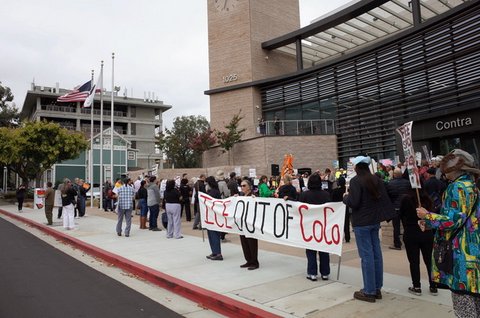
25 Jul Community Demands End to ICE Collaboration at Contra Costa TRUTH Act Forum; Sheriff Refuses

People demonstrated Tuesday outside the Contra Costa County Administration Building before the Board of Supervisors and sheriff discussed cooperation with federal immigration enforcement. (Chris Mendizabal / The CC Pulse)
By Samantha Kennedy
Contra Costa County Sheriff David Livingston was in the hot seat Tuesday morning for his department’s interactions with federal immigration authorities, and he wasn’t backing down. But there was a problem: neither were immigrant rights advocates.
Livingston took on dozens of advocates who spoke at the meeting — most of whom were a part of the more than 100 who rallied beforehand — at an hours-long Board of Supervisors meeting. The meeting hosted the annual TRUTH Act forum, a process required under state law where local law enforcement outlines interactions with the Immigration and Customs Enforcement agency.
“If ICE or other federal and even state agencies are not following the law, [it] does not mean that we must simply comply or do nothing in response,” said Johana Gurdian, a community advocate from Richmond.
Last year, the forum garnered maybe “a handful of people,” according to Supervisor John Gioia. But, since the Trump administration’s crackdown on immigration during his second term, community members this year — including those from organizations like Contra Costa Immigrant Rights Alliance, Healthy Contra Costa, Reimagine Richmond, United Latino Voices and Multi-Faith ACTION Coalition — brought a heightened sense of interest and worry to the forum.
They shared stories of families who they say are afraid to even step out of their homes, and teachers and pediatric nurses said many children they work with are afraid — worried about the possibility of their parents being taken away by ICE. Advocates also said that while Contra Costa County has shown support for the immigrant community through programs like Stand Together Contra Costa and by recently approving funding for the SAFE Center Project, any collaboration with ICE undermines immigrants’ safety and trust in the county.
Their ask of Livingston and the board was simple — end all cooperation with ICE.
“We are living in a time of American fascism now… and we will not assist them locally,” Albert Ponce, a Martinez resident and son of Mexican immigrants, told supervisors. “We need you all to stand with us to resist the unlawful violations of our civil rights.”
Under state law, local law enforcement agencies like the Sheriff’s Office are not allowed to use resources to help ICE, except in certain circumstances. Law enforcement can, for example, notify ICE in cases where an individual was convicted of certain crimes — a felony that is considered serious or violent, some non-violent felonies in the last 15 years, and a crime that can be a misdemeanor or felony in the last five years.
In 2024, ICE made 578 requests for notifications to the Sheriff’s Office, which notified the federal agency 132 times, according to Livingston. Of those notifications, 96 were for different people.
Advocates say, especially under the Trump administration, that’s still too much.
“We believe the community deserves better decisions coming from [the sheriff], ones rooted in dignity, compassion, and the belief that no one should be handed over to ICE when we have the power to say ‘no,’ ” said Miosotti Tenecora, an attorney with Immigration Legal Resource Center who presented at the forum.
Livingston vows to continue notifications
When pushed by Supervisor Ken Carlson, a former law enforcement officer, Livingston said he wouldn’t comply with an ordinance that called for zero notifications to ICE except in cases where there is a court order.
“It astounds me that people would advocate to release sex offenders, rapists, murderers, burglars, [thieves], child molesters,” Livingston said as he and Carlson talked over one another.“I am not going to do that, sir. I will notify ICE.”
Carlson told Livingston he “might not have the choice” if supervisors were to pass an ordinance saying otherwise.
“Wrong,” Livingston said.
Thomas Geiger, the attorney for the county, said that while the board has authority over the sheriff’s budget, that authority does not extend to his operational decisions. Gioia said the board could provide additional oversight of the sheriff through a civilian oversight commission or an inspector general.
Livingston’s position is nothing new, however. In other forums, the sheriff has said much of the same in defense of his continuance of notifications in certain cases.
Despite his intention to continue ICE notifications in certain cases allowed under current state law, Livingston acknowledged community concerns.
“I know that ICE has taken a different posture, and I understand the concerns of speakers here today who are upset about it,” Livingston said. “There have been mistakes made in the ways ICE has conducted its operations. We’re not involved in those operations; they don’t want us to help them. They’re not asking for help, nor would we.”
Additional reporting by Chris Mendizabal






Michael Fitzgerald
Posted at 16:23h, 26 JulyExcellent story.. Shows the situation clearly.